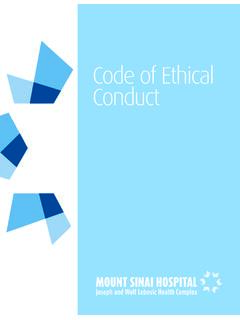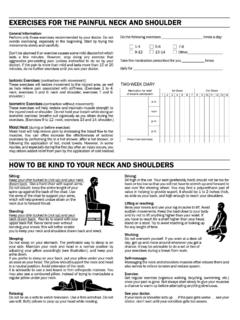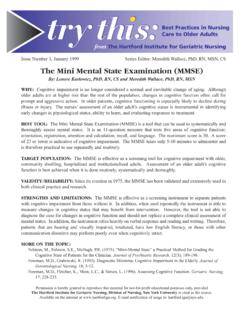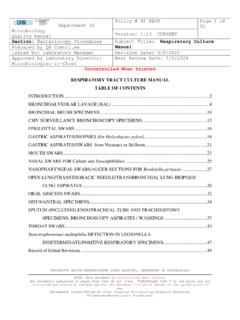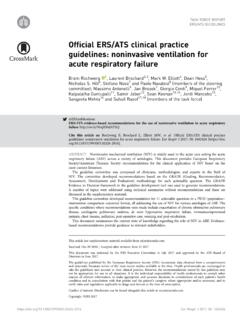Transcription of Living With Irritable Bowel Syndrome - Mount Sinai …
1 Living with Irritable Bowel Syndrome Irritable Bowel Syndrome (IBS) is a condition affecting your digestive tract. There is no definite cause for IBS, but several factors may trigger IBS symptoms: low fibre diet high fat diet food intolerances increased use of antibiotics intestinal infections busy lifestyle/stress stomach surgery emotional upset combination of the above factors IBS symptoms can include: Bowel pain, changes in Bowel habits (diarrhea, constipation or both), bloating and gas, nausea, mucus in your stools, feeling of having an incomplete Bowel movement, or frequent urge to move your bowels.
2 You may experience some or all of these symptoms but not necessarily at the same time. It is important to identify your own symptoms and the factors that trigger them. Diet, lifestyle changes and possibly medications may be needed to manage your symptoms. Management and Relief of IBS Symptoms 1. Remember that your Bowel is normal just Irritable . 2. Your Bowel will be at its best on a regular routine, such as eating meals at regular times throughout the day, and getting adequate sleep. 3. Identify and limit foods that trigger symptoms.
3 4. Eat plenty of fibre. 5. Identify sources of stress and strategies to manage them. 6. Practice relaxation strategies. 7. Enjoy regular physical activity. IBS is very individual and people have varying symptoms. Dietary management and treatment of IBS is based on an individual s specific symptoms. Therefore, self monitoring is important. This can include a journal to record food intake, symptoms, and stress. Page 1 of 7 The following information will help you manage your IBS symptoms through changes in your diet. If you have this symptom.
4 Try these diet adjustments Abdominal pain High fibre Low gassy foods Low caffeine Low fat Constipation High fibre, especially insoluble fibre Low caffeine High sugar-free fluid intake Diarrhea High fibre, especially soluble fibre Low caffeine Low fat and low spice Low sorbitol, sugars and sweets Decrease foods which may contribute to diarrhea: prune juice, coffee, beer, dried peas and beans High sugar-free fluid intake Gas Low gassy foods Low caffeine Bloating Low gassy foods Low fat Low caffeine Low sorbitol Other Diet Adjustments Alcohol this is a stimulant to your digestive system.
5 It causes the production of digestive juices and increases your appetite. For people with Irritable Bowel symptoms, it may also cause symptoms such as heartburn, abdominal pain, and diarrhea. If you drink alcohol, drink it in moderation (0 - 2 drinks a day for men; 0 - 1 drink a day for women; a drink is 5 oz of wine, 1 oz of liquor, or 12 oz of beer). If even a small amount triggers IBS symptoms, then it is best to avoid alcohol completely. Lactose this is sugar found in dairy products. Although lactose intolerance is a separate condition from IBS, it can produce similar symptoms gas, bloating, and diarrhea.
6 It is important to determine if your symptoms are actually IBS, lactose intolerance or both. Your physician can perform specific testing to determine if you have a lactose intolerance. Another option is to eliminate lactose from your diet and see if the symptoms disappear. If you are lactose intolerant, removing lactose from your diet should help to decrease gas, bloating, and diarrhea. Your dietitian can provide further direction if you wish to try a lactose-reduced diet. Page 2 of 7 Fibre Gradually increase your fibre intake from whole grain breads, cereals, fruits, vegetables, and legumes.
7 Dietary fibre can be generally classified as soluble and insoluble. Both types are present in varying amounts in different plant foods, but some foods have more of one type than the other. Soluble fibre dissolves in water forming a gel in your stomach. This slows the rate of digestion. Good sources of soluble fibre include dried peas and beans, lentils, oats, barley, psyllium, apples and citrus fruits. Research is indicating that soluble fibre sources may be the most beneficial in treating IBS symptoms. Insoluble fibre does not dissolve in water but can hold a large amount of water.
8 In this way, it acts to increase the bulkiness of stools and promote regular Bowel movements. Insoluble fibre food sources include wheat bran, whole grains and some vegetables. You need 25 to 38 grams of total fibre per day. The following chart lists some high fibre foods. A food marked with an asterisk (*) is a good source of soluble fibre. Your dietitian can provide you with further detailed information on high fibre food sources if needed. Food 2 4 grams 4 6 grams More than 6 grams Breads (2 slices) bran muffin -1 small cornbread multigrain pumpernickel* rye* 100% whole wheat bran cracked wheat Mr.
9 Pita, High Fibre - 1 pita Cereals (Portion size varies; check nutrition panel on package) All Bran Bran Flakes oat bran* Shredded Wheat Bran Chex Fruit and Fibre Raisin Bran Kashi Go Lean 100% Bran All Bran Original All Bran Buds * Fibre First Fibre One Grains (1/2 cup cooked) cornmeal natural bran - 1 tbsp wheat germ* whole wheat pasta psyllium* (1 tsp) brown rice bulgur barley* Vegetables and Legumes (1/2 cup cooked) asparagus, broccoli*, Brussels sprouts*, carrots, cauliflower, corn*, eggplant, green peas, spinach, squash* 1 baked potato with skin* 1 artichoke* black beans*, chick peas, kidney beans*, lentils*, northern beans*, pinto beans black-eyed peas*, navy beans Fruit 1 apple*, banana or orange* 3 apricots* cup raspberries* or rhubarb 1 cup strawberries* 1 pear* 1 cup blackberries* cup dried dates, prunes*, raisins Nuts and Seeds cup almonds, peanuts* (dry roasted) 2 tbsp flaxseed (ground)* Adapted from: Learning about.
10 Eating more fibre. Hamilton Health Sciences, 2006. Page 3 of 7 Note: it is very important to get adequate fluids as you slowly increase your fibre intake. Fibre needs water in order to work properly. Aim for 8 to 10 glasses of caffeine-free fluids daily--about half of this should be water. Gassy Foods Pay attention to how you are eating: Avoid gulping foods, eating quickly or talking while eating. This can increase gas production. Do not skip meals. Skipping meals allows your digestive system to fill with air. Avoid chewing gum or sucking on hard candy.
